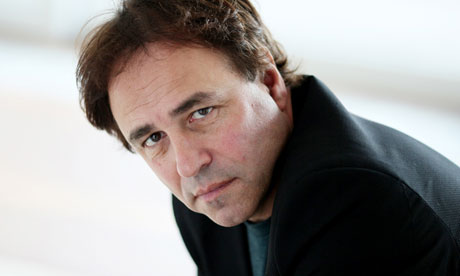 |
| A favourite project by Sir Motion, in Sheffield. |
When his recent tour of the UK came to York, VP author
Miles Cain had the chance to interview Sir Andrew Motion - the man who revolutionised the laureateship and invented the
Poetry Archive. The tour was to promote Sir Andrew's new sequel to
Robert Louis Stevenson's Treasure Island, entitled
Silver (click
here for more details), so it's that which forms the main focus, though Miles does of course manage to squeeze out some poetry discussion along the way. (That last sentence says rather more about my proclivities than either of theirs!) A shorter version appeared in the York Press, but you can consider the text below to be a
VP blog exclusive.
Miles: Where did the idea of writing a sequel to Treasure Island come about?
Sir Andrew: I first read Treasure Island when I was about 20, and even then I was thinking about it. I was interested in the unresolved things in the original plot. I made a few notes over the years. When I finished being Poet Laureate it felt like I was being let out of school. I thought I could have a bit of fun, and started to work on Silver.
M: Were you intimidated by the prospect of writing a sequel to Treasure Island?
A: I was very aware that people might think it was a foolhardy thing to do. Some people might think I was going to stick gum on the face of a national monument. Yet Stevenson was very interested in sequels. He wrote one to Kidnapped called Catriona. Also, Treasure Island is full of open doors and windows – Long John Silver gets away, the Hispaniola and several men are left on the island. It’s very odd, in a way. There’s a highly volatile atmosphere. But I wanted to move things on. The original seems to be set around the 1760s. I set the story 40 years after the setting of the original story. There didn’t seem much point on trying to do a straight copy of what Stevenson did.
M: How did you emulate the original story?
A: I was conscious of being a sort of ventriloquist of Stevenson, but wanted to make it at least a little different. Both stories begin with the map. But I was conscious of the things underneath Stevenson’s prose. He had complicated feelings about his father. Long John Silver is a sort of dark father figure in the first story.
M: A lot of children’s stories feature the absence, or death, of parents. It’s one way of allowing the story to begin.
A: That’s right. The father has to die in order for Jim to have an adventure. It’s the way the child begins to have the independent life that they wouldn't otherwise have.
M: Silver has a dark edge to it. The cover is dark, and the final chapter is entitled 'The Wreck Of All Our Hopes'. Was the dark atmosphere intentional?
A: Very much so. People associate Treasure Island with adventure, and that’s certainly there. It’s hard to imagine Pirates of The Caribbean without Treasure Island in the background. But nobody expects Pirates to include a scene where Johnny Depp gets killed. There’s a darkness and seriousness in Stevenson that I wanted to capture. Long John Silver is a person of real menace. I wanted to leave a lot of room for the dark stuff. The two books at the back of my mind were Conrad’s Heart of Darkness and Lord of The Flies. What would it be like to be left on an island for the rest of your life? It wouldn’t be the happy adventure we think it would be. It would be something very terrifying.
M: When I hear you on the radio your voice seems to have an introspection and shyness about it. But you lead quite a public life – and one of your poetry collections was entitled Public Property. How do these two aspects of your life work together?
A: I do have an appetite for public things. I have just been asked to be President of the Campaign to protect rural England and that will involve a lot of speaking at public meetings. Left to my own devices, I do want to sit at home, talk to my wife and stroke the cat. But I think there’s a balance between the two things, the public and private.
M: There were times when you found it hard being Poet Laureate?
A: Yes. I was asked to write a poem for the Today programme and I had to write about foot and mouth. They wanted a poem that was about that issue, and I found it hard because they obviously wanted something that was easily comprehensible. The best poems about anything ‘…tell all the truth but tell it slant…’ as Emily Dickinson said.
M: I heard you at a reading and you talked about ‘…work and kindness, kindness and work…’ Is that a kind of personal motto for you?
A: I’d forgotten I said that but yes, I suppose so. It’s particularly important to be kind at home to the people you are close to.
M: It seems to be a good time for poetry by women at the moment.
A: Yes, a delayed high summer, you might say. It’s good that it redresses the balance, partly through highly symbolic things, like having a woman poet laureate. It makes sure that women’s voice are at least equal to those of men. Crucial people have given encouragement over the years and we’re seeing the fruit of that now.
M: Some strong young women poets coming through at the moment, like Liz Berry.
A: Yes. Liz is a fantastically interesting writer.
M: In your biography of Philip Larkin, you quoted a passage from him that said poetry should have clarity. Is that part of poetry’s role?
A: I do think so. That is the poetry I like best. Transparency. I’ve often said that poems should look like a glass of water but taste of gin.
M: On the other hand, ambiguity is important.
A: Yes. The hard and fast answers aren’t good enough. We don’t believe them anymore. I do think, as well, that poetry links to whatever we mean when we talk about religion. A sense of the numinous is really important to poetry. We feel a wonder at the intricacy and marvelousness of the world. The older I get the more I seem to reflect on questions such as what difference can we make, why are we here, and so on.
M: As you look back on the past thirty years, what are you proud of?
I’m proud of my kids. I’m proud of the Poetry Archive – a lot of people go on that website and listen to or read poetry. I like
Silver. I like
The Invention of Doctor Cake (ed: one of Motion’s novels, vaguely about Keats - spoiler alert!) and there are a few poems that I think are strong.
A delightfully modest end there. One last fact before I sign off: Sir Motion has in fact contributed to a Valley Press book without realising it - the poem 'Motion' from Daniela Nunnari's
Red Tree was written whilst at a workshop he was leading, based on a famous painting of a woman looking out of the window (that I've temporarily forgotten details of). A great poem though, and one more literary achievement for him to be proud of!
If you're a former poet laureate and want to be interviewed for the VP blog, get in touch via the contact page.

























